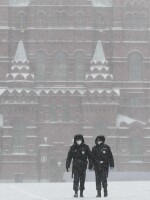MICHEL MARTIN, HOST:
For the past several weeks, protests have engulfed the nation of Georgia. That's a former Soviet republic that borders the Black Sea and sits between Russia and Turkey.
STEVE INSKEEP, HOST:
The protesters are rejecting a so-called foreign agents law that the country's parliament is considering. This bill may undermine Georgia's prospects to join Western clubs like the European Union or NATO, and that has prompted speculation that Russia is pushing it.
MARTIN: NPR's Charles Maynes is with us from Moscow, but he's just back from Georgia. Good morning, Charles.
CHARLES MAYNES, BYLINE: Good morning.
MARTIN: So these protests have been going on for several weeks. Would you just tell us what you've been seeing?
MAYNES: Well, first of all, last night, protesters blocked major roads again in the capital, Tbilisi. They were gathering in the central square, and again, there were skirmishes with police, but this followed protests that turned violent earlier this week when huge crowds gathered outside the gates of the parliament. I was there, and the government response on that night was very aggressive.
(SOUNDBITE OF CROWD YELLING)
MAYNES: So here, you can hear riot troops firing rubber bullets. There were stun grenades, water cannons and tear gas to disperse the crowds. Some protesters were beaten. Georgia's interior ministry says 65 people were detained. Protesters say more than a dozen demonstrators were injured, and the government says so were several riot troops, and yet it appears neither side is backing down. lawmakers in parliament pushed this draft law through a second round of voting on Wednesday. A final, third vote is expected later this month, and opponents of the law vow they'll keep fighting against it.
MARTIN: Would you tell us more about the law? Like, what does it propose to do, and why are we seeing such firm opposition to it?
MAYNES: Yeah. You know, this law is supported by the ruling Georgian Dream party, and it would make NGOs and media organizations that receive more than 20% of their funding from abroad to declare themselves essentially as foreign agents. Supporters make the argument that, you know, what do you have to hide? This is about transparency, it's about sovereignty. Other countries have some version of this, including, by the way, the U.S. Yet, opponents say this bill more resembles a Russian foreign agents law that the Kremlin has used to crush civil society here in Moscow in particular. They also say it's intended to derail Georgia's ambitions to join Western clubs, which would push Georgia back into Russia's orbit. Certainly, that's the view of Giorgi Gzirishvili, a 29-year-old IT specialist I met who's been out protesting the law for weeks.
GIORGI GZIRISHVILI: We are in this crossroads right now. We either have to ensure our future by becoming member of NATO and European Union, or we'll not exist in 10-15 years.
MAYNES: So clearly, he's not alone in thinking these protests are about much more than the law itself. They're about whether Georgia's future lies with Russia or the West.
MARTIN: What about the West? What has been the response from, you know, Western entities, Europe, the U.S?
MAYNES: Yeah. You know, European officials and the U.S, Georgia's allies, have all urged Georgia's government to reconsider this law. They've warned it will damage Georgia's long-term prospects to join the EU and NATO. The problem is the government backed off this law after mass protests broke out against its passage last year, so this is try number two, and they are determined not to bow to public pressure a second time. And so, for example, I was at another large rally this week in support of this law, one where the government clearly bussed in people from across Georgia to attend, but further raising the stakes here are internal politics. You know, pulling back now would make the government look weak ahead of fall elections, and that's where the ruling party claims Western-backed NGOs and independent media seek to topple them from power.
MARTIN: That is NPR's Charles Maynes. Charles, thank you.
MAYNES: Thank you, Michel.
(SOUNDBITE OF MUSIC) Transcript provided by NPR, Copyright NPR.
NPR transcripts are created on a rush deadline by an NPR contractor. This text may not be in its final form and may be updated or revised in the future. Accuracy and availability may vary. The authoritative record of NPR’s programming is the audio record.



